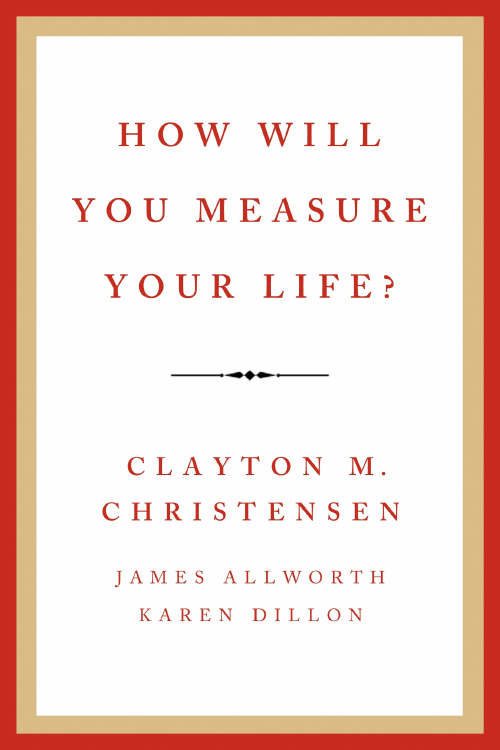“HOW WILL YOU MEASURE YOUR LIFE?” Clayton M. Christensen, James Allworth, and Karen Dillon. 2012. Harper Business. Paperback. 240 pages. $14.99.
In 1970, Stephen Covey wrote the book “Spiritual Roots of Human Relations.” Later, he rewrote the book for the business world and titled it “The Seven Habits of Highly Effective People.” Harvard business professor Clayton M. Christensen takes a similar approach, along with his co-authors, here. This is not Christensen’s first rodeo in the publishing world; he has seven other titles aimed at the business world that predated this one.
Christensen has led a varied career. Originally, he aimed to become the editor of the Wall Street Journal, but got sidetracked into business. That led to several years of starting companies and selling them, innovating, creating a think tank, and finally, becoming a professor of business at Harvard.
Here, Christensen uses a twist on that approach and looks at how theories he’s studied, created, used, and taught in the world of business and academia apply to our personal lives: Finding happiness in your career, developing personal relationships with friends, and, more importantly, at home with your wife and children, and how to make the right decisions without compromising on your personal values.
He presents situations he’s faced and worked with as a business consultant and professor, and then shows the business theories that apply to the situation, and usually what happened to the business. Once the application to the business world is shown, he shows how it applies meaningfully in the lives of everyday people.
Time and again throughout this gem of a tome, Christensen and his co-authors show that what matters in the end is the small and the interpersonal. The very theories and practices that can make companies grow and expand also work on the individual level as well, for everyone from Joe Six-Pack to Sally Soccer Mom.
When they speak of the theories, there is a certain level of academic language, but even that terminology is very understandable and not over the head of the average reader. They hope to help their readers learn how to analyze their problems, understand what their options are, allocate their resources in solving their problems, plan for future needs long before the needs arise — which is the only way to do it –, how to take the steps to put those things into motion early enough to matter, how to teach/train people/children to recognize needs and take responsibility, and not relying on others to form your own character, or the character of their children. Of course, implementing the theories and suggestions here is not easy, but in the end, they eventually do create a better life for everyone involved.
Though it is easy to read, this book is full of wisdom that will enrich the lives of those willing to take the time and energy to follow the path.
I usually find that the books that move and affect me the most become the hardest to review. And I’ve found that to be true with these two books , as well. My biggest hope is that you have come to trust me enough over the years that you’ll believe me when I say that both of these books are very much worth your time. I know these are books that have left a deep impression on me, and I hope you will feel the same, too.




